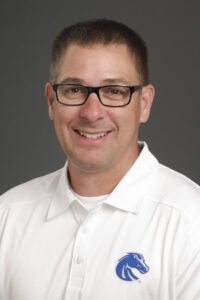Clinical Professor

Phil Ford joined the faculty of the Department of Kinesiology at Boise State University in 2014. Currently he serves as a Clinical Professor with his primary teaching in the area of sports injuries and corrective exercise. Dr. Ford comes to Boise State with an extensive leadership, clinical, and teaching background spanning more than 30 years.
Dr. Ford received his doctorate from the University of Southern Mississippi in Human Performance with and emphasis in Administration and Teaching. He also earned his master’s degree from Boise State University in Exercise and Sports Studies and his bachelor’s degree in Corporate Fitness and Wellness/Athletic Training from Grand Canyon University. In addition to being a certified/licensed athletic trainer, Dr. Ford holds professional credentials from the National Academy of Sports Medicine in Corrective Exercise and Performance Enhance Specialties.
Contact Information
Office: Bronco Gym 111
Phone: (208) 426-4278
Email: philipford@boisestate.edu